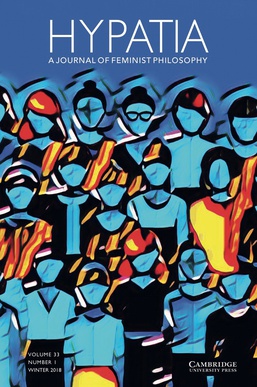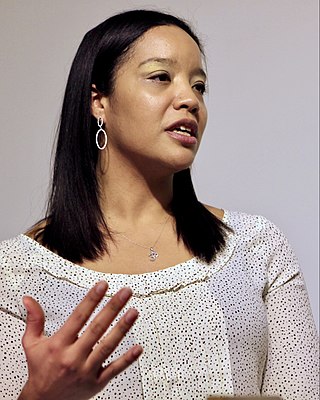Related Research Articles
Sandra G. Harding is an American philosopher of feminist and postcolonial theory, epistemology, research methodology, and philosophy of science. She directed the UCLA Center for the Study of Women from 1996 to 2000, and co-edited Signs: Journal of Women in Culture and Society from 2000 to 2005. She is currently a Distinguished Professor Emeritus of Education and Gender Studies at UCLA and a Distinguished Affiliate Professor of Philosophy at Michigan State University. In 2013 she was awarded the John Desmond Bernal Prize by the Society for the Social Studies of Science (4S).
Women have made significant contributions to philosophy throughout the history of the discipline. Ancient examples include Maitreyi, Gargi Vachaknavi, Hipparchia of Maroneia and Arete of Cyrene. Some women philosophers were accepted during the medieval and modern eras, but none became part of the Western canon until the 20th and 21st century, when some sources indicate that Susanne Langer, G.E.M. Anscombe, Hannah Arendt and Simone de Beauvoir entered the canon.
Linda Martín Alcoff is a Latin-American philosopher and professor of philosophy at Hunter College, City University of New York. Alcoff specializes in social epistemology, feminist philosophy, philosophy of race, decolonial theory and continental philosophy, especially the work of Michel Foucault. She has authored or edited more than a dozen books, including Visible Identities: Race, Gender, and the Self (2006), The Future of Whiteness (2015), and Rape and Resistance (2018). Her public philosophy writing has been published in The Guardian and The New York Times.
Alison Wylie is a Canadian philosopher of archaeology. She is a professor of philosophy at the University of British Columbia and holds a Canada Research Chair in Philosophy of the Social and Historical Sciences.

Hypatia: A Journal of Feminist Philosophy is a peer-reviewed academic journal published quarterly by Cambridge University Press. As of January 2024, the journal is led by co-editors Katharine Jenkins, Aidan McGlynn, Simona Capisani, Aness Kim Webster, and Charlotte Knowles. Book reviews are published by Hypatia Reviews Online (HRO). The journal is owned by a non-profit corporation, Hypatia, Inc. The idea for the journal arose out of meetings of the Society for Women in Philosophy (SWIP) in the 1970s. Philosopher and legal scholar Azizah Y. al-Hibri became the founding editor in 1982, when it was published as a "piggy back" issue of the Women's Studies International Forum. In 1984 the Board accepted a proposal by Margaret Simons to launch Hypatia as an autonomous journal, with Simons, who was guest editor of the third (1985) issue of Hypatia at WSIF, as editor. The editorial office at Southern Illinois University Edwardsville handled production as well until Simons, who stepped down as editor in 1990, negotiated a contract with Indiana University Press to publish the journal, facilitating the move to a new editor.
Lisa H. Schwartzman is a philosophy professor and well known feminist and social/political philosopher currently teaching at Michigan State University. Schwartzman earned her Ph.D. in philosophy at the State University of New York at Stony Brook in 2000 before going on to teach courses on feminist theory, social and political philosophy, philosophy of law, and ethics at Michigan State.
María Cristina Lugones was an Argentine feminist philosopher, activist, and Professor of Comparative Literature and of women's studies at Carleton College in Northfield, Minnesota and at Binghamton University in New York State. She identified as a U.S-based woman of color and theorized this category as a political identity forged through feminist coalitional work.
Peggy Jo DesAutels is an American academic and professor emeritus of philosophy at the University of Dayton. Her research focuses on moral psychology, feminist philosophy, feminist ethics, ethical theory, philosophy of mind, bioethics, medical ethics and cognitive science. She has received multiple awards and recognitions including Distinguished Woman in Philosophy for 2014 by the Eastern Division of Society for Women in Philosophy, and the 2017 Philip L. Quinn Prize by the American Philosophical Association.
Margaret Urban Walker is an American philosopher and academic who is the Donald J. Schuenke Chair Emerita in Philosophy at Marquette University. Before her appointment at Marquette, she was the Lincoln Professor of Ethics at Arizona State University, and before that she was at Fordham University. She has also previously held visiting appointments at Washington University in St. Louis, University of South Florida, and Catholic University of Leuven.
Alison Mary Jaggar is an American feminist philosopher born in England. She is College Professor of Distinction in the Philosophy and Women and Gender Studies departments at the University of Colorado, Boulder and Distinguished Research Professor at the University of Birmingham in the United Kingdom. She was one of the first people to introduce feminist concerns in to philosophy.
Georgia Warnke is a Distinguished Professor of Political Science and the Director of the Center for Ideas & Society at the University of California, Riverside. She chaired the Department from 2002 to 2004. She also acted as the Associate Dean for Arts and Humanities, College of Humanities, Arts and Social Sciences at UCR from 2006 to 2011.

Kathryn Sophia Belle, formerly known as Kathryn T. Gines, is an American philosopher. She is associate professor of philosophy at Pennsylvania State University. Much of her work has focused on increasing diversity within philosophy, and she is the founding director of the Collegium of Black Women Philosophers.

Miriam Solomon is Professor of Philosophy and Chair of the Philosophy Department as well as Affiliated Professor of Women's Studies at Temple University. Solomon's work focuses on the philosophy of science, social epistemology, medical epistemology, medical ethics, and gender and science. Besides her academic appointments, she has published two books and a large number of peer reviewed journal articles, and she has served on the editorial boards of a number of major journals.
Ann Garry is an American feminist philosopher. She is professor of philosophy, emerita, at California State University, Los Angeles (CSULA). While at CSULA, Garry was the founding director of the Center for the Study of Genders and Sexualities, and also served several terms as the chair of the Department of Philosophy. She has also held several visiting appointments, including serving as the Humphrey Chair of Feminist Philosophy at the University of Waterloo and Fulbright lectureships at the University of Tokyo and Eötvös Loránd University in Budapest. Although Garry no longer teaches full-time, she continues to work with graduate students.
Joan Callahan was a Professor Emerita of Philosophy at the University of Kentucky, an institution where she taught for more than twenty years and served in a variety of roles, including as director of the Gender and Women's Studies Program. Callahan's research has focused on feminist theory, critical race theory, ethics, social and political philosophy, the philosophy of law, and on the junctions of these topics.
Amy Allen is a liberal arts research professor of philosophy and women's, gender, and sexuality studies at The Pennsylvania State University, where she is also head of department. Previously, she was the Parents distinguished research professor in the humanities, and professor of philosophy and gender and women's studies, at Dartmouth College, and was chair of its department of philosophy from 2006 to 2012. Her research takes a critical approach to feminist approaches of power, and attempts to broaden traditional feminist understandings of power to apply to transnational issues.

Latin American feminism is a collection of movements aimed at defining, establishing, and achieving equal political, economic, cultural, personal, and social rights for Latin American women. This includes seeking to establish equal opportunities for women in education and employment. People who practice feminism by advocating or supporting the rights and equality of women are feminists.
Linda López McAlister was an American philosopher and academic. She held several positions in academia, spending much of her career at the University of South Florida (USF). She became Professor Emerita of Philosophy at USF in 1999. She also worked as a radio film critic and ran her own theatrical company.

The feminist philosophy journal Hypatia became involved in a dispute in April 2017 that led to the online shaming of one of its authors, Rebecca Tuvel, an assistant professor of philosophy at Rhodes College in Memphis. The journal had published a peer-reviewed article by Tuvel in which she compared the situation of Caitlyn Jenner, a trans woman, to that of Rachel Dolezal, a white woman who identifies as black. When the article was criticized on social media, scholars associated with Hypatia joined in the criticism and urged the journal to retract it. The controversy exposed a rift within the journal's editorial team and more broadly within feminism and academic philosophy.
References
- 1 2 3 4 5 6 7 8 Schutte, Ofelia. "Curriculum Vitae" (PDF). Archived from the original (PDF) on 29 September 2013. Retrieved 25 September 2013.
- 1 2 3 4 5 6 7 DesAutels, Peggy. "Ofelia Schutte: September 2013". Highlighted Philosophers. American Philosophical Association. Retrieved 25 September 2013.
- ↑ Bardwell-Jones, Celia T (1 January 2008). "Border Communities and Royce: The Problem of Translation and Reinterpreting Feminist Empiricism". Journal of Speculative Philosophy: A Quarterly Journal of History, Criticism, and Imagination. 22 (1): 12–23.
- 1 2 Martín-Alcoff, Linda (Summer 2004). "Schutte's Nietzschean Postcolonial Politics". Hypatia: A Journal of Feminist Philosophy. 19 (3): 144–156.